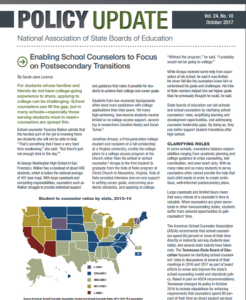For students whose families and friends do not have college-going experience to share, applying to college can be challenging. School counselors can fill the gap, but in many schools—especially those serving students most in need—counselors are spread thin.
A NASBE policy update (October 2017) explores the ways state boards of education can address the challenges school counselors face and better support student transitions after high school.
This self-paced, foundational program offers two-and-a-half hours of lively, engaging learning. It’s a comprehensive introduction to a subject that grows more important every day.
Financial Aid 101 includes seven easy-to-use learning modules packed with information on subjects like loans, grants, scholarships and work study available from public and private sources. The program features informative graphics and videos, as well as occasional quizzes to help you measure your progress.
Developed for entry-level professionals in either the counseling or admission field, this interactive course tackles the fundamental concepts and best practices on which you can build your professional knowledge base, expand your current skill set, and help further your career.
Learn More: https://www.nacacnet.org/professional-development/elearning/
For students whose families and friends do not have college-going experience to share, applying to college can be challenging. School counselors can fill the gap, but in many schools—especially those serving students most in need—counselors are spread thin.
A new NASBE policy update (October 2017) explores the ways state boards of education can address the challenges school counselors face and better support student transitions after high school.

Find more information on counselor workshops, webinars, and resources from the College Board.
Written for undergraduate students and other prospective counselors, A Guide to Graduate Programs in Counseling is the first of its kind to create a comprehensive, reliable means of learning about the counseling profession, entry level preparation (i.e., master’s degrees in counseling specializations), and what to consider when searching for, applying to, and ultimately selecting a graduate program in counseling that is the “perfect fit.” The Guide offers vital information relative to accreditation and its importance in the counseling profession with regards to obtaining licensure, certification, and even employment opportunities after graduating. As a CACREP publication, this book is the official source of information about accredited counseling programs and includes information about what counseling programs seek in candidates, what programs can offer students in terms of professional development and job placement, and guidance on personal and practical considerations for entering the counseling profession. Authored by counseling experts and featuring insights from voices in the field, A Guide to Graduate Programs in Counseling is a must-have resource for anyone interested in becoming a professional counselor.
